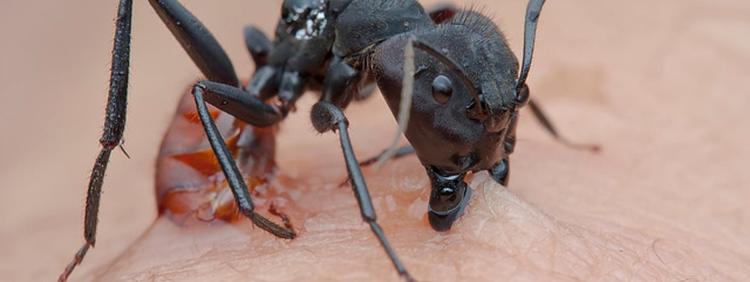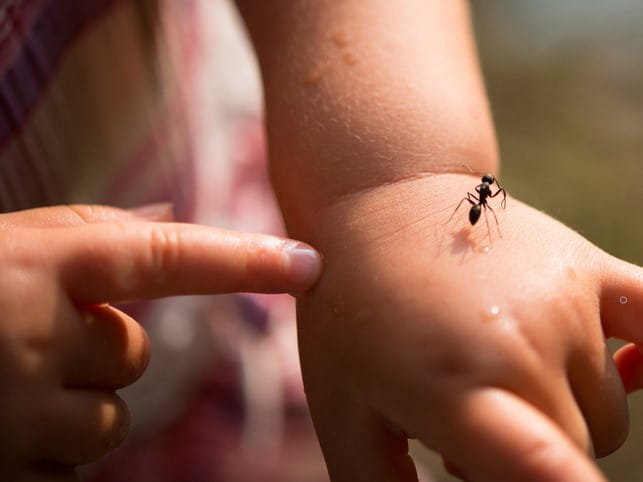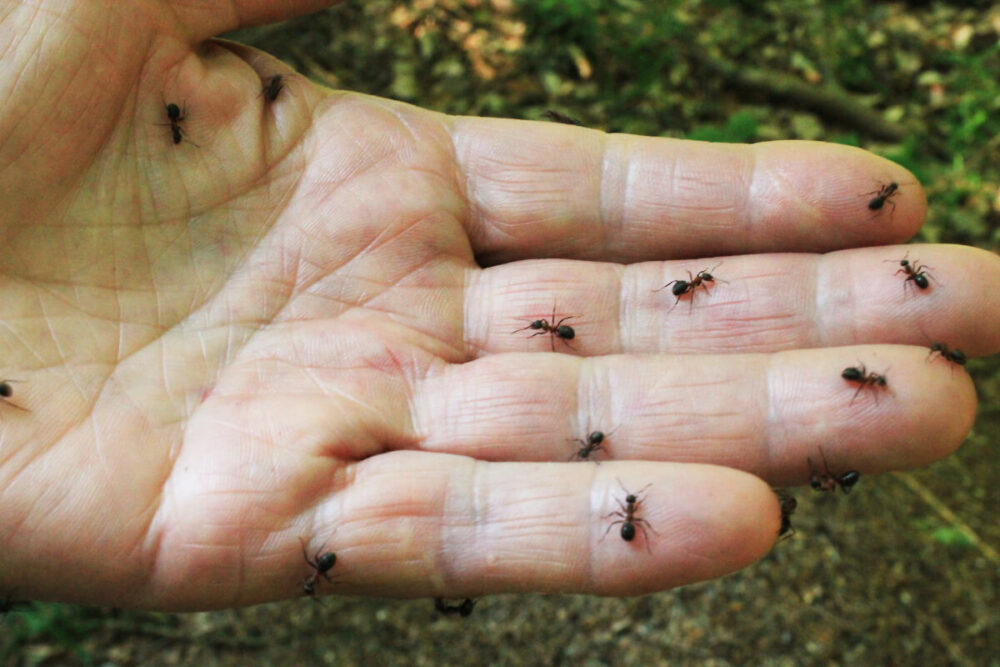If a black ant bites you, clean the area with soap and water to prevent infection. Black ant bites are not typically dangerous and can be treated with basic care at home.
While often just a nuisance, some people may experience localized pain, redness, and swelling. In rare cases, certain ants like carpenter ants can inject formic acid causing a burning sensation. Immediate first aid involves washing the bite area with antibacterial soap, applying ice to reduce swelling, and using antihistamines or hydrocortisone cream for itching.
If skin is broken, apply antibiotic ointment and bandage the wound. Remember to seek medical attention if you experience severe symptoms or an allergic reaction.

Credit: www.trulynolen.ca
What Happens If A Black Ant Bites You
Imagine walking in your garden or enjoying a picnic outdoors when suddenly, you feel a stinging sensation on your skin. You look down to see a black ant, and soon enough, you start to experience pain and discomfort. What happens if a black ant bites you? Let’s explore the effects of black ant bites on the body, different reactions, treatments, and preventive measures.
Black Ant Bites And Their Effects On The Body
Black ant bites can result in mild to moderate pain, redness, and swelling at the site of the bite. The pain is often described as stinging or burning, and the affected area may itch intensely. In rare cases, individuals may experience allergic reactions, leading to more severe symptoms such as difficulty breathing, swelling of the face and throat, and dizziness.
Different Types Of Reactions To Black Ant Bites
Reactions to black ant bites can vary from person to person. Some individuals may only experience localized pain, redness, and swelling, while others may develop allergic reactions with more severe symptoms. It’s essential to monitor any unusual symptoms or reactions and seek medical attention if necessary.
Treatment For Black Ant Bites
- Wash the affected area with soap and water to prevent infection.
- Apply a cold compress or ice pack to reduce swelling and alleviate pain.
- Over-the-counter antihistamines or topical creams, such as hydrocortisone, can help relieve itching and discomfort.
- If the symptoms are severe or if an allergic reaction occurs, seek immediate medical attention.
Prevention And Home Remedies For Black Ant Bites
To prevent black ant bites, it’s important to take measures to minimize exposure to these insects. This can include sealing cracks and crevices in the home, keeping food sealed and stored properly, and maintaining a clean environment to deter ant infestations. If bitten, home remedies such as a paste of baking soda and water or aloe vera gel may provide relief from itching and inflammation.
Are Black Ant Bites Harmful?
Black ant bites are a common occurrence. Let’s delve into understanding the potential harm of these bites and their implications on your health.
Understanding The Harmfulness Of Black Ant Bites
Black ant bites typically cause minor skin irritation, manifested by redness and mild swelling. The discomfort is usually temporary and subsides quickly.
Comparison To Other Ant Species
Unlike fire ants that inject venom, black ant bites are less painful and harmful. Fire ant bites can cause severe reactions in sensitive individuals.
Can Black Ant Bites Cause Infection?
Although rare, black ant bites can potentially lead to an infection if the skin is broken. It is essential to clean the bite area promptly to prevent infection.
How To Treat Black Ant Bites
If a black ant bites you, immediately clean the bite area with antibacterial soap and water to prevent infections. Apply ice to reduce swelling and take antihistamines or use hydrocortisone cream to stop itching. Always seek medical attention if symptoms worsen or if there is an allergic reaction.
Immediate Steps To Take After Being Bitten
1. Wash bite area with soap and water to prevent infection.
2. Apply ice to reduce swelling.
3. Take antihistamines or hydrocortisone cream to relieve itching.
Recommended Practices For Treating Black Ant Bites
1. Clean wounds with soap and warm water.
2. Apply antibiotic ointment to broken skin.
3. Bandage the wound if necessary.
Over-the-counter Remedies For Black Ant Bites
- Apply calamine lotion to soothe the affected area.
- Take pain relievers like acetaminophen or ibuprofen for discomfort.
Preventing Black Ant Bites
Black ants, while typically harmless, can deliver painful bites when provoked. Here are essential tips for avoiding black ant bites, identifying and controlling infestations, as well as natural and home remedies for repelling these insects.
Tips For Avoiding Black Ants
To prevent encountering black ants, follow these guidelines:
- Keep food containers sealed tightly to avoid attracting black ants into your home.
- Maintain a clean kitchen and dining area, wiping up spills promptly.
- Seal cracks and crevices in your home’s exterior to prevent black ants from entering.
- Dispose of garbage regularly and keep outdoor trash bins tightly closed.
Identifying And Controlling Black Ant Infestations
If you suspect a black ant infestation, here’s how to identify and control it:
- Look for trails of black ants, typically entering from cracks or crevices.
- Use ant baits or sprays specifically designed for black ants to eliminate infestations.
- Consider seeking professional pest control services for severe infestations.
Natural And Home Remedies For Repelling Black Ants
To repel black ants using natural and home remedies, try the following:
- Use a mixture of vinegar and water to clean ant trails, as ants dislike the smell of vinegar.
- Place cinnamon or coffee grounds near entry points as these scents deter black ants.
- Peppermint oil can be dabbed around windows and doors to repel black ants due to its strong scent.
Identifying Black Ant Bites
If you have ever been bitten by an ant, you know that the pain and irritation it can cause can be quite unpleasant. But what if a black ant bites you? How can you identify a black ant bite and distinguish it from other insect bites? In this section, we will discuss the characteristics and appearance of black ant bites, how to distinguish them from other insect bites, and the medical diagnosis of black ant bites.
Characteristics And Appearance Of Black Ant Bites
When it comes to identifying black ant bites, it’s important to understand the characteristics and appearance of such bites. Black ant bites typically appear as small, red bumps on the skin. These bumps may be accompanied by minor swelling, itching, and mild pain. Unlike some other insect bites, black ant bites usually do not cause any serious allergic reactions or long-lasting effects.
Distinguishing Black Ant Bites From Other Insect Bites
In order to distinguish black ant bites from other insect bites, it’s important to pay attention to certain aspects. One key characteristic is the presence of a small, red bump, which is a common feature of black ant bites. Additionally, black ant bites are often accompanied by mild itching and pain. However, it’s important to note that these symptoms may vary depending on the individual and the severity of the bite.
Medical Diagnosis Of Black Ant Bites
If you suspect that you have been bitten by a black ant and are experiencing symptoms such as red bumps, itching, and mild pain, it is advisable to seek medical diagnosis. A healthcare professional will be able to examine the bite and determine whether it is indeed a black ant bite or a bite from another insect. They may also recommend appropriate treatment options to provide relief from the symptoms.
In conclusion, identifying black ant bites can be done by recognizing their characteristics and appearance, distinguishing them from other insect bites, and seeking medical diagnosis if needed. By understanding these aspects, you can better manage and treat black ant bites to alleviate any discomfort they may cause.

Credit: www.poison.org

Credit: www.positivepest.net
Frequently Asked Questions Of What If A Black Ant Bites You
What Happens If A Black Ant Bites You?
A black ant bite is generally harmless and may cause minor pain, redness, and swelling. Clean the area with soap and water and apply an antiseptic ointment to prevent infection. If necessary, use ice, antihistamines, or hydrocortisone cream to relieve itching and swelling.
Are Black Ants Harmful?
Black ant bites are not harmful and typically cause only minor irritation. Clean the bite area with soap and water.
Should You Pop Black Ant Bites?
You should not pop black ant bites. Clean the area with soap and water to prevent infection. Apply ice to reduce swelling and use antihistamines or hydrocortisone cream for itching.
How Do You Get Rid Of Black Biting Ants?
To get rid of black biting ants, clean the area with soap and water to prevent infection. You can apply ice to reduce swelling and use antihistamines or hydrocortisone cream to ease itching. If the skin is broken, apply antibiotic ointment and bandage the wound.
Conclusion
Black ant bites may cause itching and redness, but they are generally not dangerous. It is essential to wash the bite with antibacterial soap and water. Applying ice can help reduce swelling, and taking antihistamines can alleviate itching. If the skin is broken, antibiotic ointment and bandages should be applied.

I’m MD Tanvir, and I bring years of expertise gained from working closely with pest control companies to the forefront. My journey in the industry has inspired me to launch Bug Battler, a platform aimed at equipping people with the know-how to combat pests autonomously. Through Bug Battler, I aim to empower individuals with practical insights to tackle pest infestations effectively.

